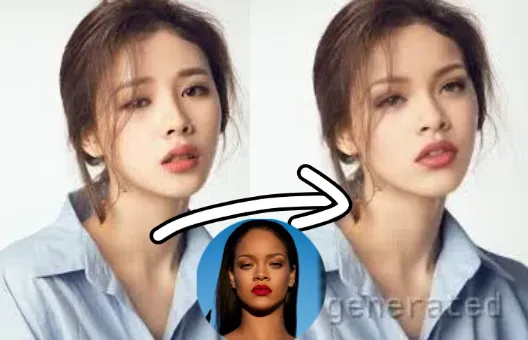Rihanna deepfakes
Rihanna and the Rise of Deepfakes An Exploration of Authenticity, Creativity, and the Digital Frontier

- Alexander Reed
- 6 min read

 Rihanna and the Rise of Deepfakes An Exploration of Authenticity, Creativity, and the Digital Frontier
Rihanna and the Rise of Deepfakes An Exploration of Authenticity, Creativity, and the Digital Frontier
In the realm of pop culture, few names resonate as loudly and vibrantly as Rihanna. Born Robyn Rihanna Fenty on February 20, 1988, in the picturesque yet humble surroundings of Saint Michael, Barbados, Rihanna has transcended her island roots to become a global icon, celebrated for her unparalleled musical prowess, creative versatility, and unwavering authenticity. However, as the digital frontier continues to expand, so too do the challenges faced by public figures like Rihanna. One such challenge is the emergence of deepfakes—a sophisticated form of digital manipulation that raises questions about authenticity, creativity, and the very essence of identity in the digital age.
The Genesis of a Global Icon ai face swap video online free
Rihanna’s journey from a vulnerable girl navigating the complexities of school bullying and family strife to a dazzling international superstar is nothing short of remarkable. Her childhood was marked by adversity; she faced relentless bullying due to her light complexion, inherited from her Irish ancestors, and struggled academically as teachers often misjudged her defensive behavior. The strain of these experiences led to severe headaches and a sense of isolation that persisted for years. The divorce of her parents when she was 14 further compounded her challenges, yet she emerged from these trials with resilience and a fierce determination to succeed.
Rihanna’s musical career took off in 2005 with the release of her debut album, “Music of the Sun,” which marked her official entry into the American music scene. Her breakthrough came in 2008 with the release of “Umbrella,” a collaboration with Jay-Z that earned her the first of her numerous Grammy Awards and cemented her status as a trailblazer for Barbadian artists. Over the years, Rihanna has released a string of critically acclaimed albums, including “Anti” (2016), which won her the Michael Jackson Video Vanguard Award at the MTV Video Music Awards, and has ventured into acting, starring in films like “Ocean’s 8” (2018) and “Valerian and the City of a Thousand Planets” (2017).
The Advent of Deepfakes: A Double-Edged Sword
As Rihanna’s star continued to rise, so did the sophistication of digital technology. Deepfakes, a term coined to describe highly realistic fake videos or audio created using deep learning algorithms, have emerged as a double-edged sword in the digital landscape. On one hand, they offer unprecedented creative possibilities, allowing artists and filmmakers to explore new narratives and visual effects that were previously unimaginable. On the other hand, deepfakes pose significant risks to individual privacy, authenticity, and the integrity of information.
The potential misuse of deepfakes is particularly alarming in the context of public figures like Rihanna. Malicious actors can create fake videos that portray her in ways that are misleading, harmful, or even defamatory. These videos can spread rapidly on social media platforms, damaging her reputation and potentially causing long-term harm to her career and personal life.
The Intersection of Creativity and Authenticity
Rihanna’s appeal lies not just in her musical talent but also in her authenticity and willingness to embrace her challenges with grace and tenacity. Her public persona is a symphony of resilience and reinvention, inspiring millions of fans worldwide. However, the rise of deepfakes threatens to undermine this authenticity by creating false representations that can deceive even the most discerning viewer.
The challenge for Rihanna and other public figures is to navigate this digital minefield while maintaining their creative integrity and authenticity. This requires a nuanced understanding of both the creative potential and the ethical implications of deepfakes. On the creative front, Rihanna could potentially leverage deepfakes to explore new artistic avenues, such as creating immersive virtual concerts or interactive storytelling experiences that push the boundaries of traditional media.
However, on the ethical front, she must be vigilant in protecting her image and reputation from misuse. This involves working closely with legal and technical experts to develop robust strategies for detecting and mitigating the spread of fake content. It also requires a proactive approach to education and awareness-raising, encouraging fans and the public to be critical consumers of digital media and to recognize the signs of deepfake manipulation.
The Role of Technology and Regulation
Addressing the challenges posed by deepfakes requires a multi-faceted approach that combines technological advancements, regulatory frameworks, and public education. On the technological front, researchers are continuously developing new tools and algorithms to detect and combat deepfakes. These include machine learning models that can identify subtle artifacts and inconsistencies in fake videos, as well as blockchain-based solutions that can ensure the integrity and authenticity of digital content.
Regulatory frameworks also play a crucial role in mitigating the risks associated with deepfakes. Governments and international organizations are increasingly recognizing the need for comprehensive legislation that addresses the creation, distribution, and consumption of fake content. This includes establishing clear definitions of what constitutes a deepfake, setting penalties for those who violate these definitions, and providing support for victims of deepfake-related crimes.
Public education is another vital component of the fight against deepfakes. By raising awareness among consumers about the risks and implications of fake content, we can empower them to make informed decisions and take action to protect themselves and others from harm. This includes promoting critical thinking skills, encouraging skepticism towards unverified information, and fostering a culture of digital literacy that values authenticity and integrity.
Conclusion: Embracing the Digital Frontier with Authenticity and Creativity
Rihanna’s journey from a vulnerable girl in Barbados to a global icon is a testament to the power of resilience, creativity, and authenticity. As the digital frontier continues to evolve, she and other public figures face new challenges in maintaining their integrity and reputation in the face of sophisticated deepfake technologies.
However, by embracing these challenges with a nuanced understanding of both the creative potential and ethical implications of deepfakes, we can harness their power for positive transformation. This involves developing robust strategies for detecting and mitigating fake content, fostering a culture of digital literacy that values authenticity and integrity, and promoting critical thinking skills among consumers of digital media.
In this way, we can ensure that the digital frontier remains a vibrant and dynamic space for creativity and expression, while also protecting the rights and reputations of those who dare to dream and pursue their passions with fearless determination. Rihanna’s story serves as a powerful reminder that, even in the face of adversity and uncertainty, authenticity and creativity can light the way forward.
- Tags:
- Rihanna Deepfakes